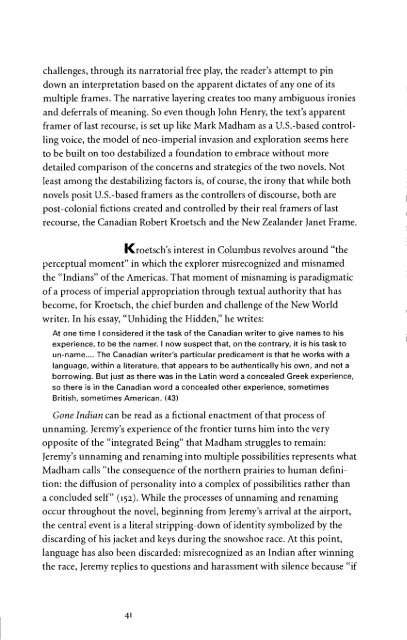The Carpathians - University of British Columbia
The Carpathians - University of British Columbia
The Carpathians - University of British Columbia
Create successful ePaper yourself
Turn your PDF publications into a flip-book with our unique Google optimized e-Paper software.
challenges, through its narratorial free play, the reader's attempt to pin<br />
down an interpretation based on the apparent dictates <strong>of</strong> any one <strong>of</strong> its<br />
multiple frames. <strong>The</strong> narrative layering creates too many ambiguous ironies<br />
and deferrals <strong>of</strong> meaning. So even though John Henry, the text's apparent<br />
framer <strong>of</strong> last recourse, is set up like Mark Madham as a U.S.-based controlling<br />
voice, the model <strong>of</strong> neo-imperial invasion and exploration seems here<br />
to be built on too destabilized a foundation to embrace without more<br />
detailed comparison <strong>of</strong> the concerns and strategies <strong>of</strong> the two novels. Not<br />
least among the destabilizing factors is, <strong>of</strong> course, the irony that while both<br />
novels posit U.S.-based framers as the controllers <strong>of</strong> discourse, both are<br />
post-colonial fictions created and controlled by their real framers <strong>of</strong> last<br />
recourse, the Canadian Robert Kroetsch and the New Zealander Janet Frame.<br />
Kroetsch's interest in Columbus revolves around "the<br />
perceptual moment" in which the explorer misrecognized and misnamed<br />
the "Indians" <strong>of</strong> the Americas. That moment <strong>of</strong> misnaming is paradigmatic<br />
<strong>of</strong> a process <strong>of</strong> imperial appropriation through textual authority that has<br />
become, for Kroetsch, the chief burden and challenge <strong>of</strong> the New World<br />
writer. In his essay, "Unhiding the Hidden," he writes:<br />
At one time I considered it the task <strong>of</strong> the Canadian writer to give names to his<br />
experience, to be the namer. I now suspect that, on the contrary, it is his task to<br />
un-name.... <strong>The</strong> Canadian writer's particular predicament is that he works with a<br />
language, within a literature, that appears to be authentically his own, and not a<br />
borrowing. But just as there was in the Latin word a concealed Greek experience,<br />
so there is in the Canadian word a concealed other experience, sometimes<br />
<strong>British</strong>, sometimes American. (43)<br />
Gone Indian can be read as a fictional enactment <strong>of</strong> that process <strong>of</strong><br />
unnaming. Jeremy's experience <strong>of</strong> the frontier turns him into the very<br />
opposite <strong>of</strong> the "integrated Being" that Madham struggles to remain:<br />
Jeremy's unnaming and renaming into multiple possibilities represents what<br />
Madham calls "the consequence <strong>of</strong> the northern prairies to human definition:<br />
the diffusion <strong>of</strong> personality into a complex <strong>of</strong> possibilities rather than<br />
a concluded self" (152). While the processes <strong>of</strong> unnaming and renaming<br />
occur throughout the novel, beginning from Jeremy's arrival at the airport,<br />
the central event is a literal stripping-down <strong>of</strong> identity symbolized by the<br />
discarding <strong>of</strong> his jacket and keys during the snowshoe race. At this point,<br />
language has also been discarded: misrecognized as an Indian after winning<br />
the race, Jeremy replies to questions and harassment with silence because "if

















